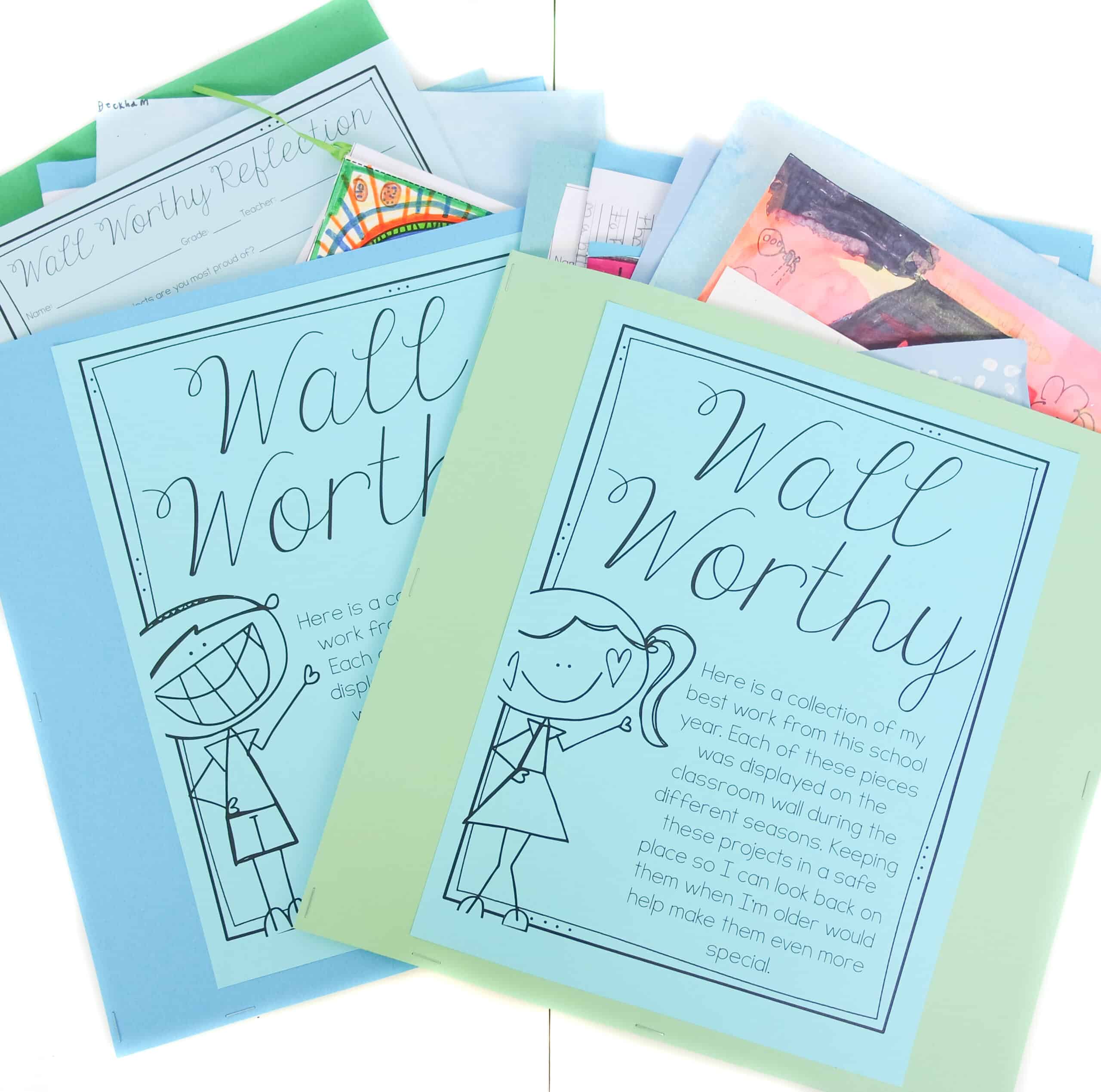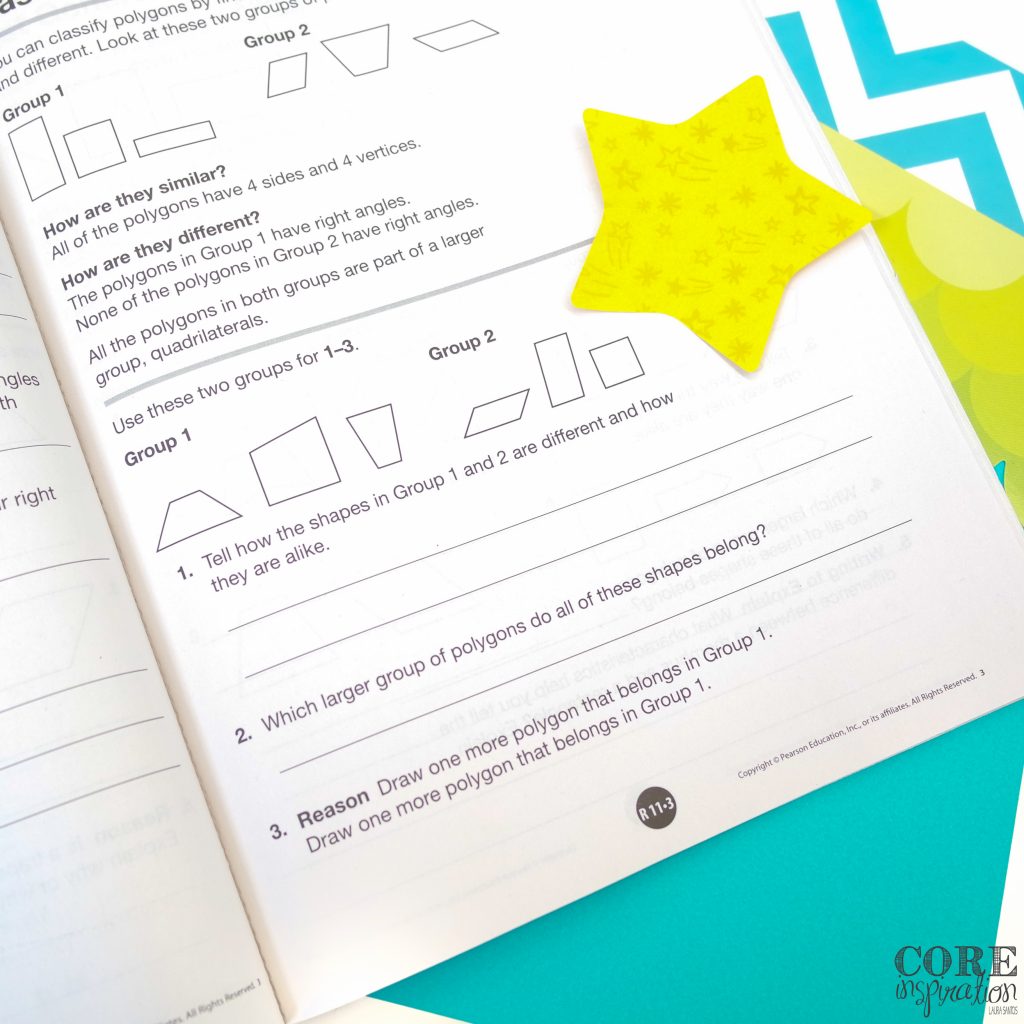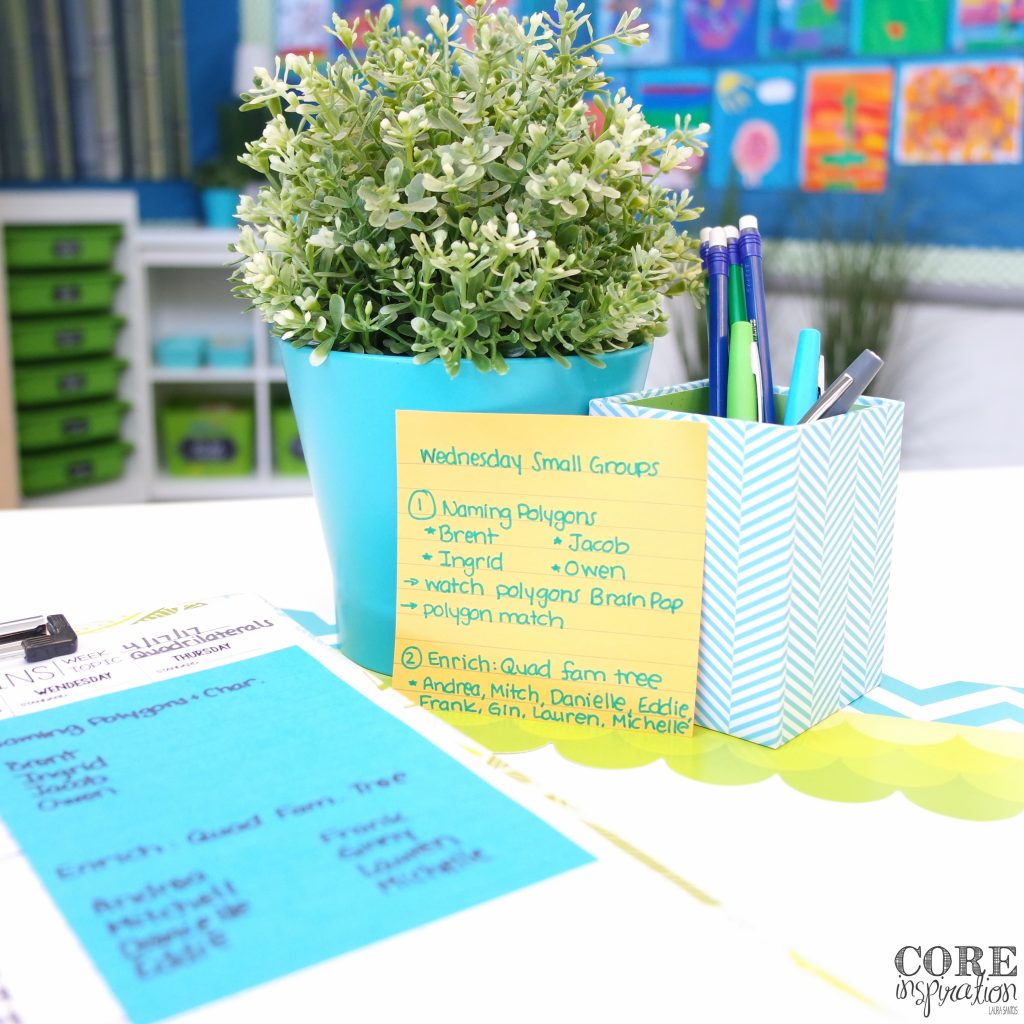
If you are living in a constant battle between tracking data and planning instruction…you know you’re not alone. Like most teachers, you are probably looking for ways to minimize the time you spend grading, and recording data so you can maximize your time planning and prepping. You’re in the right place.
The most important shift you can make as a teacher is to set up systems that allow you to be more present during instruction and practice time in your classroom. Creating a simple framework that embeds data tracking into your workshop time will allow you to genuinely focus on your students’ strengths and needs, minimize the need for lengthy assessments, reduce tedious grading, and maximize student engagement.
Currently, the five steps below are working well to do just that during my Meet With The Teacher rotation during Math Workshop. Give them a try, and tweak them to be your own.
Create a multi-point scale that provides a definition of student levels of understanding. Many districts have a scale in place already. If not, you may want to use the scale below (used in my school district) as a starting point.
Introduce this scale to your students, and spend some time having them create their own titles, and student definitions for each level of understanding. This will help them take ownership of the scale, and make it easier for you to have efficient conversations with them about the work they’re doing during Math Workshop, and beyond.
During each Math Workshop session, I highly recommend selecting only one math standard, and one mathematical practice to assess. This simplifies the data tracking process, and makes grouping and conferring decisions more straightforward.
Making students aware of the mathematical practice you’ll be observing helps them focus their brain power on that practice, resulting in more rapid growth.
When introducing Math Workshop to your class, it is important to acknowledge that, although you will be noting a specific mathematical practice, and focusing on a specific math skill each day, all strong mathematicians pull a variety of skills and practices from their tool belt every day during workshop.=
When deciding what students will do to demonstrate their understanding of the skill being assessed that day, select an activity or question that allows students to evaluate, analyze, make connections, or find patterns when problem solving.
Selecting questions that simply require students to recall facts or solve a series of simple equations will not allow you to fully assess their depth of understanding.

This may mean creating a series of assessment tasks that your students will work on throughout the year. You can also make this happen by analyzing the set of problems you will assign each day, and selecting the problem that fits the bill.
If you are interested in a year-long collection of higher order problem solving tasks, you can grab my Second Grade Write To Explain Task Cards, or Third Grade Problem Solving Task Cards (shown above) to save you some time.
Create a simple form that allows you to quickly note student understanding using the mastery scale you designed for step 1.
If you’re looking for a starting point, the forms introduced in my How To Organize Small Groups post may work. You may also want a piece of paper, a digital doc, or a sticky note to jot quick noticings about needs for small group instruction, and individual student conferences.
If you are required to send graded work home with students frequently, you can quickly mark the score you’ve given for the activity, and follow up with a few verbal comments to the student about their performance. Have the student record the justification for their score, and make a quick personal plan for future growth.
This practice promotes student listening as you discuss feedback, and gives them time to reflect on that feedback as they put it in writing. Another worthwhile practice is having students complete a self-assessment of their work.
When planning for the next workshop session, refer to your data to determine your next instructional steps, and to create or curate activities for differentiation. You will feel so empowered when you pull out your data tracking sheet from Math Workshop earlier that day, and dig right into planning rather than pulling out your stack of papers and correcting pens.

If your district requires you to enter data into your online gradebook frequently, quickly plug your data into the system and jump into planning for the next day.
I hope these steps get you started with setting up a data tracking framework that allows you to be more present during Math Workshop (and throughout the day), makes your planning time more about planning (and less about grading), and helps you get a clear picture of your students’ levels of understanding.
I’d love to hear how these steps work for you, and answer any questions you may have about implementing. Share your thought in the comments below.
For more details about Math Workshop, check out my other posts about this instructional approach.
If you want to give Math Workshop a test drive in your own classroom, grab your Math Workshop Starter Kit, and feel free to share any questions you have about implementation in the comments below.


I’ve been an elementary teacher for ten years, and love sharing tips and resources that make differentiated learning more manageable for you. Thank you for visiting.
Learn More
Dropping by with weekly tips, classroom strategies, and free content created with you in mind.
Join me and other 2nd through 4th grade educators in the Teaching with Core Inspiration Facebook Group. This is a place to collaborate, ask questions, and learn how teachers like you are using Core Inspiration resources in their classrooms. Hope to see you there!
© 2024 Core Inspiration ∙ Website by KristenDoyle.co
30 Responses
Where can we find your math practices sheet? Are those a set you use throughout the year?
Hi Keale, you can find them here. Yes, they are designed to be used throughout the year. They include all eight standards for mathematical practice.
Where can I find your pwpt you use with the timer for the stations?
Hi Laurie, I don’t currently have the PowerPoint available but I am glad you let me know you have an interest.
Do you have copies of the 5 steps, levels of understanding, and the feedback forms available in your store?
Hi Miranda, I don’t currently have them available. I appreciate you asking and showing your interest. 🙂 I can add that to my project list for the summer months.
I would love a copy of the levels of understanding page!
Hi Alison, I have included it in my Math Workshop Starter Kit. You can check it out here.
I would love them as well! I would like the categories editable if possible – we have district phrasing and proficiency scales outlined for us.
Hi Jessica, thank you for reaching out. I have an editable version ready and posted in my TPT store along with all the other resources shown in my math workshop posts. You can find it here.
Thanks! I purchased your starter set today! I’m excited to put it all into play this year.
Hi Jessica! Thank you for taking the time to share your excitement. 🙂 Please let me know if you have any questions along the way this school year.
Will you creating all the print outs you use? The math feedback sheet? The labels you use? Literally everything!
I will buy it all! If you do can you email me [email protected]
Hi Alexandria, yes I am making a M.A.T.H. Workshop starter kit this summer. It will be ready for back to school in August. Stay tuned. 🙂
Hi, Laura,
I am curious as to whether you give a formal assessment at the end of each unit, or if you use the data you gather as your assessments. My district recently adopted EnVision, and I am trying to decide if I want to use the Performance Task assessments that EnVision provides for each topic. Also, thank you for this amazing blog and all of the TPT items you have available. You are making setting up Math Workshop super easy for me.
Laura
Hi Laura, thank you for the kind words. I am happy to hear you find the posts and resources helpful. I did give a formative assessment at the end of most units. For some units, I used the Envision Performance Tasks, for others used the “Transfer Tasks” included in the Third Grade Problem Solving Task Card Collections. I did not give a separate assessment for my geometry unit this year because my students completed the Quadrilateral City project, which I used for assessment. I also used the Time of Your Life project as an assessment for the time unit.
Thank you for the assessment information. That is really helpful.
HI, I noticed that the “Meet with the teacher” is not a part of the rotation. When are you pulling them? Is it while they are working independently or while they are at another station?
Hi Pamela, I tend to prefer not to have a set Meet With the Teacher schedule because I enjoy the freedom of balancing small groups and one on one conferences each day. If i am teaching a unit that the majority of my class has little background knowledge on (division in third grade for example) I will create a set Meet With the Teacher schedule. I talk about this balance in a bit more detail in this post.
Where did you purchase the organizers such as the rubric trays?
Hi Jane,
The drawers for the rubric trays are from Ikea. They are part of the Trofast system. The labels for the rubric trays are found in my M.A.T.H. Workshop Starter Kit.
Warmly,
Laura
Tell me about the group drop box. Is this were they turn in completed work like the task cards?
I just purchased your starter kit. I am hoping I can successfully implement it in 5th grade.
Hi Elie, I use the drop box for homework collection each day. You can read about all the details here. Enjoy!
Warmly,
Laura
I’m so excited to start using your system. I know its late in the game, but what I normally do just isn’t working for my class this year. I was curious about your rubric bins. What exactly do you put in them?
Thanks!
Hi Kimberly,
Thank you for taking the time to share your excitement. Nothing wrong with making a few mid-year changes. 🙂 I have written about my rubric drawers in detail in this post. Please let me know if you have any additional questions after reading.
Warmly,
Laura
HI,
I am a first year teacher and am currently doing MATH workshop, however I do have a few questions. I am currently meeting with all students everyday because I have been presenting the lesson to each small group just differentiating it according to each group’s level. So this takes A LOT of time. I like how you use the 5-10 mini lesson and let some learn the skill on a video. How do you know if they are getting the lesson that day? For instance, our curriculum moves very quickly so I am worried that if they have a misconception that day and I don’t meet with them then, by the time I see their exit ticket and form my groups for the next day, the focus standard will have already changed. How to you monitor students the day of to see if they have the standard mastered or not?
Secondly, sorry this is wordy haha, when students meet with you does that take away from their time they would’ve had at Technology or Hands on, etc?
Thank you! Loving EVERYTHING YOU DO! You have my brain swirling for next year 🙂
Hi Alexandra,
Thank you for reaching out. I am able to determine whether students understood the lesson each day based on their performance during the mini lesson. During the lesson, students work through problems with me, followed by problems to show what they know. I also use pre-assessments at the beginning of a unit or trimester to determine who I need to check in on each day. If things are looking a little iffy for a student based on the pre assessment or during the lessan problems, I make sure to check their seat work. There are times that this means they miss out on hands on or tech, but never consistently. 🙂
Hope this helps!
Warmly,
Laura
I currently teach 8th grade and it’s not uncommon for me to have kids that test on 4th/5th grade level. Yet, they will all take the same end of year test. I would love to incorporate more with groups to help students yet teach them the 8th grade material without it being overwhelming for all of us. We have 85 minute blocks and now have 1:1 devices. I have started some flipping but struggle making them do that outside of class as well. Seems each year, the concept of doing things outside the classroom is more and more of a struggle. I would appreciate suggestions about incorporating something like this in an 8th grade classroom.
Thank you
How is this working for you? I love the concept, but am teaching 7th grade self-contained and am not sure it will work with the common core standards I must follow. Let me know your thought as I think the routine of it will greatly help my students.
Hi Candice, I’ve been using this specific version of the data tracking system for three years, and I love it.